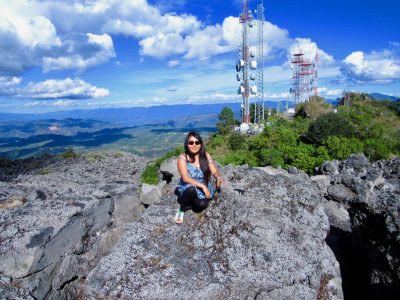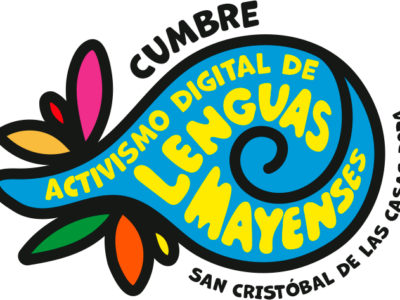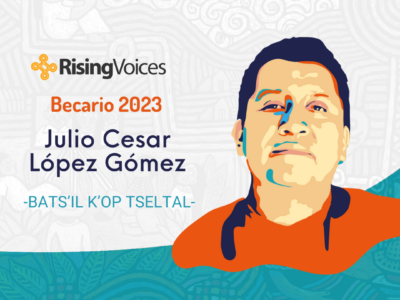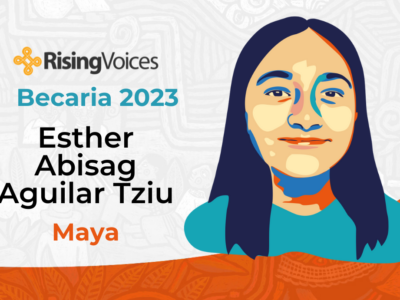
Photograph by Tzintia Montaño.
In 2020, we continue our social media campaign by inviting different hosts to manage the @ActLenguas (Language Activism) Twitter account and share their experiences with the revitalization of and advocacy for native languages. This profile post is about Tzintia Montaño (@kolotzin_) and what she plans to discuss during her week as a host.
Rising Voices (RV): Please tell us about yourself.
Me llamo Tzintia Montaño, soy de Santiago Huajolotitlán, en la mixteca oaxaqueña, y también de la CDMX, así que me considero una ña’a davi chilanga.
Estudié Letras Clásicas en la UNAM y posteriormente, después de años de reflexión, decidí dirigir mis pasos hacia la lengua de mi familia, el da’an davi o mixteco de la frontera Puebla-Oaxaca. Por ello, estudié la maestría de Estudios Amerindios y Educación Bilingüe en la UAQ donde me interesó el estudio de la vitalidad lingüística y me enfoqué sobre todo en trabajar con la comunidad transnacional mixteca Puebla-NuevaYork, circuito migratorio al que mi familia pertenece.
Durante este proceso, aprendí mucho sobre la identidad, el territorio, la autoadscripción y la lengua en contexto transnacional. Posteriormente la suerte me llevó a trabajar con las lenguas indígenas y el Procesamiento del Lenguaje Natural, donde comencé con la recopilación de corpus paralelo en Comunidad Elotl.
My name is Tzintia Montaño, I am from Santiago Huajolotitlán, in the Mixtec region of Oaxaca, and also from Mexico City, so I consider myself a ña’a davi Chilanga [resident of Mexico City].
I studied Classical Languages at the National Autonomous University of Mexico (UNAM), and later I decided to dedicate myself to the study of my family's language, the da’an davi, or Mixtec, spoken along the Puebla-Oaxaca border. For this reason, I enrolled in the Master's degree program in Amerindian Studies and Bilingual Education at the Autonomous University of Queretaro (UAQ), where I was interested in studying the linguistic vitality and focused on working with the Puebla-New York Mixtec transnational community, to which my family belongs.
During this process, I learned a lot about identity, territory, self-identification and language in a transnational context. Later on, I started working with indigenous languages and Natural Language Processing, and I began compiling a parallel corpus with the Elotl Community.
RV: What is the current status of your language on the internet and offline?
Como macro lengua, el tu’un savi comprende, según el INALI, 81 variantes y abarca los estados de Oaxaca, Puebla y Guerreo, así como algunas partes de Baja California y los Estados Unidos, debido a la migración. Cada una de estas variantes presenta un nivel de vitalidad distinto, ya que podemos encontrar comunidades donde los niños están aprendiendo tu’un savi como lengua materna, mientras que en otros lugares la lengua es hablada sólo por la generación de los abuelos o los tatarabuelos. Lamentablemente este último es el caso del da’an davi, cuyos hablantes más jóvenes oscilan entre los 50 y 60 años.
Podría parecer a simple vista que el tu’un savi, en general, cuenta con cierta presencia en internet, sobre todo en redes sociales; sin embargo, al acercarnos a cada una de las variantes, y en este caso al da’an davi, encontramos que en realidad existen escasos recursos en la web.
According to the National Indigenous Languages Institute (INALI), as a macrolanguage tu’un savi comprises 81 variants and covers the states of Oaxaca, Puebla and Guerreo, as well as some parts of Baja California and the United States, due to migration. Each of these variants has a different level of vitality, since we can find communities where children are learning tu’un savi as their mother tongue, while in other places the language is spoken only by the generation of grandparents or great-grandparents. Unfortunately, the latter is the case of da’an davi, whose youngest speakers range from 50 to 60 years.
At first glance, it might seem that tu’un savi, in general, is well represented on the internet, especially on social networks. However, when we look at each of the variants, and in this case the da’an davi, we find that there are actually few resources on the web.
RV: On what topics do you plan to focus during the week that you’ll manage the @ActLenguas Twitter account?
Los temas que me interesan abordar son identidad y autoadscripción, la lengua mixteca en contexto transnacional, migración y territorialidad y, por último, tecnologías del lenguaje. Quiero compartir esto temas, desde diferentes puntos de vista, con el auditorio de @ActLenguas para lograr una reflexión colectiva.
I am interested in addressing issues of identity and self-identification, the Mixtec language in a transnational context, migration and territoriality and, finally, language technologies. I want to share these topics from different points of view, and to reflect on them together with the @ActLenguas audience.
RV: What are the main motivations for your digital activism for your language? What are your hopes and dreams for your language?
En primer lugar, me gustaría que hubiera más material de aprendizaje en da’an davi. Mi sueño es que la comunidad de hablantes crezca e ir apropiándonos cada vez más de nuevos espacios de uso. En segundo lugar, deseo que el activismo tenga repercusión en las tecnologías del lenguaje, así como en la revitalización del da’an davi. Es un trabajo que largo aliento, pero estoy convencida de dedicar mi tiempo y mi esfuerzo en la tarea de tener nuevas generaciones de hablantes del da’an davi.
First of all, I wish there was more learning material in da’an davi. My dream is for the community of speakers to grow and to increasingly appropriate new spaces of use. Second, I want this activism to have an impact on language technologies, as well as on the revitalization of da’an davi. It is a long-term project, but I have decided to dedicate my time and effort to the task of having new generations of da’an davi speakers.



